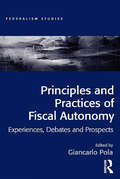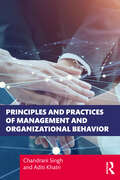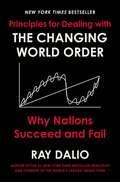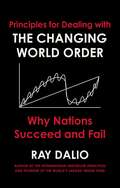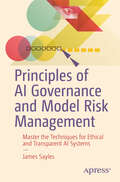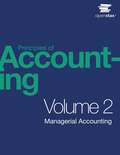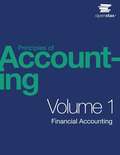- Table View
- List View
Principles and Practice of Property Valuation in Australia
by David ParkerThis book provides a clear outline of the key principles underlying property valuation and the current techniques and issues in the practice of valuation for the major sectors of the Australian real estate market. Formerly titled Valuation Principles and Practice, this entirely new third edition comprises Australia's leading advanced valuation textbook. The first part of the book, Principles of valuation, comprises chapters written by globally recognised academics and specialists on the principles of law, economics, planning, policy and finance, all in the context of property valuation. The second part of the book, Practice of valuation, comprises chapters written by acknowledged expert valuers on the practice of valuation for key property sectors including residential, retail, commercial, industrial, leisure and rural. Further, chapters also cover valuations for purposes including lending, insurance, rating, taxation and financial reporting. The most up to date valuation text for the Australian market, this book will appeal to both valuation practitioners and undergraduate/postgraduate students as well as to accountants, lawyers and professionals dealing with property valuation issues.
Principles and Practice of Social Marketing
by Rob Donovan Nadine HenleyTheory and practice come together by combining the latest research with real-life examples of social marketing campaigns.
Principles and Practices of Fiscal Autonomy: Experiences, Debates and Prospects (Federalism Studies)
by Giancarlo PolaThis century has seen the continuation of long-term trends in the movement of the territorial boundaries of nation states alongside the emergence of new tensions. The repercussions of the Scottish referendum and the heightened urgency of the Catalonia question along with the continued economic problems faced by the Eurozone have given new energy and context to debates on institutional and fiscal autonomy. Assessing the impact of increasing calls for wider fiscal autonomy in the UK, Spain, Switzerland, Argentina, Brazil, Germany, Italy and the USA this volume updates and adds significant new context to the debate. Framing the discussion on fiscal autonomy and drawing out ethical considerations it portrays the problems connected with the devolution of responsibilities and financial resources to sections of the population, sometimes content to be part of a lower layer of government, sometimes aspiring to an asymmetrical position or total independence.
Principles and Practices of Management and Organizational Behavior
by Chandrani Singh Aditi KhatriThis book offers perspectives, insights, techniques, and approaches for efficient and contemporary management practices in an organization. It provides a comprehensive insight into the traditional and contemporary approaches of organizational behavior and their impact on organizational performance in the global era. Ranging from planning to staffing, and controlling to strategic decision-making, the case studies in the book incorporate relevant modern management models and correlate practices of management from organizational perspectives to allow any organization’s direction and environment to be evaluated with suggested recommendations. This textbook consists of two broad parts. The first deals with management trends and functions ranging from the traditional era to the contemporary world. The second part explores the behavioral trends of organizations across domains to analyze the measures taken for improved productivity and sustainability. Drawing theories from psychology, sociology and economics, this book probes into the interrelation between behavior and holistic management by examining the impact of teamwork, motivation, organizational power, and polity, instituting relevant organizational ethics and strategies to create healthy organizational culture. This book will be useful to students, academicians, management researchers, and industry professionals from the field of general management and organizational behavior. It will also be useful for scholars interested in management studies, behavioural studies, business and development, developmental studies, sociopsychology, management, and business strategies.
Principles and Practices of Management and Organizational Behavior
by Chandrani Singh Aditi KhatriThis book offers perspectives, insights, techniques, and approaches for efficient and contemporary management practices in an organization. It provides a comprehensive insight into the traditional and contemporary approaches of organizational behavior and their impact on organizational performance in the global era. Ranging from planning to staffing, and controlling to strategic decision-making, the case studies in the book incorporate relevant modern management models and correlate practices of management from organizational perspectives to allow any organization’s direction and environment to be evaluated with suggested recommendations. This textbook consists of two broad parts. The first deals with management trends and functions ranging from the traditional era to the contemporary world. The second part explores the behavioral trends of organizations across domains to analyze the measures taken for improved productivity and sustainability.Drawing theories from psychology, sociology and economics, this book probes into the interrelation between behavior and holistic management by examining the impact of teamwork, motivation, organizational power, and polity, instituting relevant organizational ethics and strategies to create healthy organizational culture.This book will be useful to students, academicians, management researchers, and industry professionals from the field of general management and organizational behavior. It will also be useful for scholars interested in management studies, behavioural studies, business and development, developmental studies, sociopsychology, management, and business strategies.
Principles and Practices of Transportation Planning and Engineering
by Lei Zhang Connie TangConnie Kelly Tang and Lei Zhang have provided a holistic coverage of the entire surface transportation project and program development process from the beginning of planning though environmental approval, design, right-of way acquisition, construction to operations and maintenance.— Neil Pedersen, Executive Director, Transportation Research Board, National Academies of Sciences, Engineering, and Medicine, Washington, DC Transportation program and project development is complex. The process spans over planning, programming, environment, design, right of way, construction, operations, and maintenance. Professionals from civil engineering, planning, social and environmental sciences, business and project management, and data science, work together in a relay team to transform an idea into a highway, a transit hub, an airport or a water facility. It is challenging for any one person to master all the knowledge and skills needed to perform every relevant task. However, it is critical for all involved to understand how this relay works and how the societal, environmental, governmental, and regulatory contexts influence the process and the technical solution. Professionals who understand the process and see the big picture are those who rise to the top as leaders. Transportation Project and Program Development provides holistic coverage on the technical subject matter, processes and procedures, and policy and guidance associated with transportation project and program development, which can help professionals become program leaders. For each phase of the process, key products delivered, processes used, governing principles, foundations of applicable science and engineering, technologies deployed, and knowledge required are discussed. While all coverages reflect the practices of the United States, the logic, principles, science, and engineering are applicable to all countries of the world. The book can also serve as an introductory textbook for undergraduate students and as a textbook or reference for a graduate-level course in civil engineering, transportation engineering, planning, and project management.
Principles for Dealing with the Changing World Order: Why Nations Succeed and Fail (Principles)
by Ray DalioNEW YORK TIMES BESTSELLER * MORE THAN ONE MILLION COPIES SOLD &“A provocative read...There are few tomes that coherently map such broad economic histories as well as Mr. Dalio&’s. Perhaps more unusually, Mr. Dalio has managed to identify metrics from that history that can be applied to understand today.&” —Andrew Ross Sorkin, The New York Times From legendary investor Ray Dalio, author of the #1 New York Times bestseller Principles, who has spent half a century studying global economies and markets, Principles for Dealing with the Changing World Order examines history&’s most turbulent economic and political periods to reveal why the times ahead will likely be radically different from those we&’ve experienced in our lifetimes—and to offer practical advice on how to navigate them well. A few years ago, Ray Dalio noticed a confluence of political and economic conditions he hadn&’t encountered before. They included huge debts and zero or near-zero interest rates that led to massive printing of money in the world&’s three major reserve currencies; big political and social conflicts within countries, especially the US, due to the largest wealth, political, and values disparities in more than 100 years; and the rising of a world power (China) to challenge the existing world power (US) and the existing world order. The last time that this confluence occurred was between 1930 and 1945. This realization sent Dalio on a search for the repeating patterns and cause/effect relationships underlying all major changes in wealth and power over the last 500 years. In this remarkable and timely addition to his Principles series, Dalio brings readers along for his study of the major empires—including the Dutch, the British, and the American—putting into perspective the &“Big Cycle&” that has driven the successes and failures of all the world&’s major countries throughout history. He reveals the timeless and universal forces behind these shifts and uses them to look into the future, offering practical principles for positioning oneself for what&’s ahead.
Principles for Dealing with the Changing World Order: Why Nations Succeed or Fail (Principles Ser.)
by Ray DalioFrom legendary investor Ray Dalio, author of the international bestseller Principles, who has spent half a century studying global economies and markets, Principles for Dealing with the Changing World Order examines history&’s most turbulent economic and political periods to reveal why the times ahead will likely be radically different from those we&’ve experienced in our lifetimes - but similar to those that have happened many times before. A few years ago, Ray Dalio noticed a confluence of political and economic conditions he hadn&’t encountered before. They included huge debts and zero or near-zero interest rates that led to massive printing of money in the world&’s three major reserve currencies; big political and social conflicts within countries, especially the US, due to the largest wealth, political and values disparities in more than 100 years; and the rising of a world power (China) to challenge the existing world power (US) and the existing world order. The last time that this confluence occurred was between 1930 and 1945. This realisation sent Dalio on a search for the repeating patterns and cause/effect relationships underlying all major changes in wealth and power over the last 500 years. In this remarkable and timely addition to his Principles series, Dalio brings readers along for his study of the major empires - including the Dutch, the British and the American - putting into perspective the 'Big Cycle' that has driven the successes and failures of all the world&’s major countries throughout history.Dalio reveals the timeless and universal forces behind these shifts and uses them to look into the future, offering practical principles for positioning oneself for what&’s ahead.
Principles for Governance: Strategies for Reducing Inequality and Promoting Human Development (Sustainable Development Goals Series)
by Alfredo Pereira Francisco SousaThis edited volume provides strategies for reducing inequality and promoting human development through the use of innovative digital technology and the adoption of new bioethical principles for governance. The book is structured around a series of practical proposals which can be adapted to different circumstances, countries, and political systems. Written by an interdisciplinary panel of international researchers and professionals, each chapter details a proposal for a policy—new social technology, Green Deals, robust social assistance—that will move society forward towards a sustainable, digital, and equitable future. Researchers across multiple disciplines--public administration, cognitive technology, E-learning, finance, philosophy of economy, agronomics, forest engineering, bioethics and education—will find this volume a useful reference.
Principles for Navigating Big Debt Crises (Principles Ser.)
by Ray DalioRay Dalio, the legendary investor and international bestselling author of Principles - whose books have sold more than five million copies worldwide - shares his unique template for how debt crises work and principles for dealing with them well. This template allowed his firm, Bridgewater Associates, to anticipate 2008&’s events and navigate them well while others struggled badly. As he explained in his international bestseller Principles, Ray Dalio believes that almost everything happens over and over again through time, so that by studying patterns one can understand the cause-effect relationships behind events and develop principles for dealing with them well. In this three-part research series, he does just that for big debt crises and shares his template in the hopes of reducing the chances of big debt crises happening and helping them be better managed in the future. The template comes in three parts: 1. The Archetypal Big Debt Cycle (which explains the template) 2. Three Detailed Cases (which examines in depth the 2008 financial crisis, the 1930s Great Depression and the 1920s inflationary depression of Germany&’s Weimar Republic) 3. Compendium of 48 Cases (which is a compendium of charts and brief descriptions of the worst debt crises of the last 100 years)Whether you&’re an investor, a policy maker, or are simply interested in debt, this unconventional perspective from one of the few people who navigated the crisis successfully, Principles for Navigating Big Debt Crises will help you understand the economy and markets in revealing new ways.
Principles for Navigating Big Debt Crises (Principles)
by Ray DalioRay Dalio, the legendary investor and #1 New York Times bestselling author of Principles—whose books have sold more than five million copies worldwide—shares his unique template for how debt crises work and principles for dealing with them well. This template allowed his firm, Bridgewater Associates, to anticipate 2008&’s events and navigate them well while others struggled badly.As he explained in his #1 New York Times bestseller Principles, Ray Dalio believes that most everything happens over and over again through time so that by studying patterns one can understand the cause-effect relationships behind events and develop principles for dealing with them well. In this three-part research series, he does just that for big debt crises and shares his template in the hopes of reducing the chances of big debt crises happening and helping them be better managed in the future. The template comes in three parts: 1. The Archetypal Big Debt Cycle (which explains the template) 2. Three Detailed Cases (which examines in depth the 2008 financial crisis, the 1930s Great Depression, and the 1920s inflationary depression of Germany&’s Weimar Republic) 3. Compendium of 48 Cases (which is a compendium of charts and brief descriptions of the worst debt crises of the last 100 years) Whether you&’re an investor, a policy maker, or are simply interested in debt, this unconventional perspective from one of the few people who navigated the crisis successfully, Principles for Navigating Big Debt Crises will help you understand the economy and markets in revealing new ways.
Principles of AI Governance and Model Risk Management: Master the Techniques for Ethical and Transparent AI Systems
by James SaylesNavigate the complex landscape of Artificial Intelligence (AI) governance and model risk management using a holistic approach encompassing people, processes, and technology. This book provides practical guidance, oversight structure and centers of excellence, and actionable insights for organizations seeking to harness the power of AI responsibly, ethically, and transparently. By addressing the technical, ethical, and societal dimensions of AI governance, organizations will be empowered to build trustworthy AI systems that benefit both their bottom line and the broader community. Featuring successful mitigating controls based on proven use cases, the book underscores the importance of aligning AI strategy with AI governance, striking a balance between AI innovation, risk mitigation as well as broader business goals. You’ll receive pointers for designing a well-governed AI development lifecycle, emphasizing transparency, accountability, and continuous monitoring throughout the AI development lifecycle. This book highlights the importance of collaboration between stakeholders, i.e., boards of directors, CxOs, corporate counsel, compliance officers, audit executives, data scientists, developers, validators, etc. You’ll gain practical advice on addressing the challenges related to the ownership of AI-generated content and models, stressing the need for legal frameworks and international collaboration. You’ll also learn the importance of auditing AI systems, developing protocols for rapid response in case of AI-related crises, and building capacity for AI actors through education. Principles of AI Governance and Model Risk Management demonstrates its value-added uniqueness by detailing a strategy to ensure a cohesive approach to managing AI-related risks, global compliance, policy, privacy, and AI-human collaboration and oversight. What You Will Learn Different approaches to AI adoption, from building in-house AI capabilities to partnering with external providers Key factors to consider when choosing an AI solution and how to ensure its successful integration into existing workflows AI technologies, their business impact, and ethical considerations to make informed decisions and foster responsible AI The environmental impacts of AI systems and the need for sustainable practices in AI development and deployment. Who This Book is For Business executives and process owners/representatives, risk officers, cybersecurity professionals, legal counsel and ethics officers, human resource professionals, data scientists, AI developers, and CTOs.
Principles of Accounting, 12th Edition
by Marian Powers Susan V. Crosson Belverd E. NeedlesNeedles/Powers/Crosson PRINCIPLES OF ACCOUNTING is continuously evolving to meet the needs of today's learner. This edition's new structure is based on research with students about the best way to deliver content in this course! The chapters in Needles/Powers/Crosson have been organized into the Three Section Approach, which helps you more easily digest the content. The first section is Concepts and focuses on the overarching accounting concepts that require consistent reiteration throughout the course. With a clear understanding of the concepts, you are then ready to experience the second section--Accounting Applications. Here you practice the application of accounting procedures with features like "Apply It" and a new transaction analysis model, which clearly illustrates how transactions are the result of business decisions and recorded in a way to show their effects on the financial statements. Finally, you utilize section three, Business Applications. This section illustrates how the concepts and procedures are used to make business decisions. Real company examples are used throughout the chapter to show students the relevance of the material. This logical progression through the material is further supported in the online environment in CengageNOW with the Tri-Level Problem. This problem mirrors the Three Section Approach and connects the sections to facilitate a more complete understanding. These substantial changes will make you a more efficient learner and are designed to prepare you for a business world increasingly complicated by ethical issues, globalization.
Principles of Accounting, Volume 2: Managerial Accounting
by OpenStax Mitchell Franklin Patty Graybeal Dixon CooperPrinciples of Accounting is designed to meet the scope and sequence requirements of a two-semester accounting course that covers the fundamentals of financial and managerial accounting. Due to the comprehensive nature of the material, we are offering the book in two volumes. This book is specifically designed to appeal to both accounting and non-accounting majors, exposing students to the core concepts of accounting in familiar ways to build a strong foundation that can be applied across business fields. Each chapter opens with a relatable real-life scenario for today’s college student. Thoughtfully designed examples are presented throughout each chapter, allowing students to build on emerging accounting knowledge. Concepts are further reinforced through applicable connections to more detailed business processes. Students are immersed in the “why” as well as the “how” aspects of accounting in order to reinforce concepts and promote comprehension over rote memorization.
Principles of Accounting: Volume 1: Financial Accounting
by OpenStax Mitchell Franklin Patty Graybeal Dixon CooperPrinciples of Accounting is designed to meet the scope and sequence requirements of a two-semester accounting course that covers the fundamentals of financial and managerial accounting. Due to the comprehensive nature of the material, we are offering the book in two volumes. This book is specifically designed to appeal to both accounting and non-accounting majors, exposing students to the core concepts of accounting in familiar ways to build a strong foundation that can be applied across business fields. Each chapter opens with a relatable real-life scenario for today’s college student. Thoughtfully designed examples are presented throughout each chapter, allowing students to build on emerging accounting knowledge. Concepts are further reinforced through applicable connections to more detailed business processes. Students are immersed in the “why” as well as the “how” aspects of accounting in order to reinforce concepts and promote comprehension over rote memorization.
Principles of Accounts for the Caribbean: 6th Edition
by Sheila Robinson Frank Wood AssociatesGuide students through the new syllabus with a full-colour, revised edition of a well-known and trusted title, and prepare them for post-secondary and professional studies in Accounting.- Ensure students understand a range of theoretical and practical techniques used in accounting. - Enable students to participate more effectively and responsibly in today's business environment and improve management of budgeting, savings and investment. - Navigate the revised syllabus with ease with a book matching the structure and coverage, as well as including a detailed section on the Student Based Assessment with an annotated example to help students when planning their own. - Prepare for examinations with the 'Helpful hints' feature, containing study tips, practice tips and examiner tips; practice questions are also included in the Student eTextbook. - Make topics relatable with case studies included.
Principles of Accounts for the Caribbean: 6th Edition Epub
by Sheila Robinson Elaine Mayall Andrienne JonesGuide students through the new syllabus with a full-colour, revised edition of a well-known and trusted title, and prepare them for post-secondary and professional studies in Accounting.- Ensure students understand a range of theoretical and practical techniques used in accounting. - Enable students to participate more effectively and responsibly in today's business environment and improve management of budgeting, savings and investment. - Navigate the revised syllabus with ease with a book matching the structure and coverage, as well as including a detailed section on the Student Based Assessment with an annotated example to help students when planning their own. - Prepare for examinations with the 'Helpful hints' feature, containing study tips, practice tips and examiner tips; practice questions are also included in the Student eTextbook. - Make topics relatable with case studies included.
Principles of Adaptive Processes: Moving Beyond Budgeting
by Jeremy Hope Robin FraserThis chapter identifies and explains key principles and practices of managing with adaptive processes rather than annual budgets. By removing the budgeting process and fixed performance contract, firms are able to change the attitudes and behaviors of people at every level of the organization.
Principles of Advertising: A Global Perspective, Second Edition
by Monle Lee Carla Johnson"A complete and well-organized textbook on advertising"-Educational Book ReviewPrinciples of Advertising: A Global Perspective, Second Edition updates the classic first edition of this exceptional classroom resource, selected as one of CHOICE magazine&’s Outstanding Academic Titles for 1999. Ideal for use as an introductory textbook, the book presents an integrated marketing approach that&’s essential for keeping up with the changing world of contemporary advertising, and reflects the authors&’ expertise not just in advertising, but also in the larger field of integrated marketing communications. The new edition of the book examines the environment in the advertising industry following the terrorist attacks on Sept. 11, 2001, as well as market segmentation, target marketing, product positioning, buyer behavior, legal and political concerns, the creative aspects of advertising, and much more.Principles of Advertising: A Global Perspective, Second Edition equips instructors-and their students-with the fundamental elements of the field with emphasis on ethical issues. The book includes a foreword by Don E. Schultz of Northwestern University&’s Integrated Marketing Communication program and provides insights into effective local, national, and global integrated marketing strategies for print, electronic, and online advertising. This updated edition maintains the original format for each chapter of featuring "Global Perspectives," "Ethics Tracks," and short commentaries from practitioners in various fields, and adds 24 new illustrations and more recent examples of now-famous advertising campaigns. New material presented in Principles of Advertising: A Global Perspective, Second Edition includes: the benefits of a graduate degree client-agency relationships targeting the middleman marketing to men Janet Jackson "exposed" pop-up ads marketing cosmetic surgery advertising as programming controversial campaigns behavioral targeting or online stalking? Principles of Advertising: A Global Perspective, Second Edition examines new theories, new technologies, well-known advertising campaigns, and cultural considerations for advertising in foreign markets to give your students current and proven information on the changing world of advertising.
Principles of Agribusiness Management, Fifth Edition
by James G. Beierlein Kenneth C. Schneeberger Donald D. OsburnPrinciples of Agribusiness Management is designed for students taking either their first or only course in agribusiness management. - For agribusiness students it is a solid foundation for higher-level courses. - For nonmajors it provides a broad and necessary understanding of basic agribusiness management skills that will complement a technical major. - For working professionals who need to enhance their management skills, it provides a comprehensive, straightforward presentation of all the key management concepts and skills needed for success.
Principles of Agricultural Economics
by Paul W. Barkley Andrew BarkleyPrinciples of Agricultural Economics, now in its third edition, continues to showcase the power of economic principles to explain and predict issues and current events in the food, agricultural, and agribusiness sectors. This key text introduces economic principles in a succinct and reader-friendly format, providing students and instructors with a clear, up-to-date, and straightforward approach to learning how a market-based economy functions, and how to use simple economic principles for improved decision making. The field of agricultural economics has expanded to include a wide range of topics and approaches, including macroeconomics, international trade, agribusiness, environmental economics, natural resources, and international development and these are all introduced in this text. For this edition, new and enhanced material on agricultural policies, globalization, welfare analysis, and explanations of the role of government in agriculture and agribusiness is included. Readers will also benefit from an expanded range of case studies and text boxes, including more international cases, which discuss real world examples and issues including global hunger, biofuels, trade wars, agritourism, and climate change. This book is ideal for courses on agricultural economics, microeconomics, rural development and environmental policy. The work is fully supported by a companion website which provides users with extra content to enhance their learning and further their understanding of agricultural economics. Additional materials include flash cards, study guides, PowerPoints, multiple choice questions, essay questions, and an instructor’s manual.
Principles of Agricultural Economics
by Paul W. Barkley Andrew BarkleyPrinciples of Agricultural Economics, now in its fourth edition, continues to showcase the power of economic principles to explain and predict issues and current events in the food, agricultural, and agribusiness sectors. This key text introduces economic principles in a succinct and reader-friendly format, providing students and instructors with a clear, up-to-date, and straightforward approach to learning how a market-based economy functions and how to use simple economic principles for improved decision-making. The field of agricultural economics has expanded to include a wide range of topics and approaches, including macroeconomics, international trade, agribusiness, environmental economics, natural resources, and international development, and these are all introduced in this text. For this edition, new and enhanced material on agricultural policies, globalization, welfare analysis, and explanations of the role of government in agriculture and agribusiness is included. Readers will also benefit from an expanded range of case studies and text boxes, including real-world examples such as the Ukraine conflict, the Coronavirus pandemic, and immigration. The work is supported by a companion website, including flash cards, study guides, PowerPoint presentations, multiple choice questions, essay questions, and an instructor’s manual. This book is ideal for courses on agricultural economics, microeconomics, rural development, and environmental policy.
Principles of Agricultural Economics (Routledge Textbooks in Environmental and Agricultural Economics)
by Paul W. Barkley Andrew BarkleyPrinciples of Agricultural Economics, now in its second edition, showcases the power of economic principles to explain and predict issues and current events in the food, agricultural, agribusiness, international trade, natural resource and other sectors. The field of agricultural economics has expanded to include a wide range of important and interesting topics, including macroeconomics, international trade, agribusiness, environmental economics, natural resources, and international development. For this new edition, the text has been updated throughout with a new chapter on policy, separate chapters for supply and demand, and increased coverage of key topics and approaches including finance, trade and behavioural economics. Readers will also benefit from an expanded range of case studies which demonstrate real world examples of the principles under discussion. These include obesity, alternative fuels, trade disputes, and animal welfare. The companion website provides students and instructors with extra material in order to enhance their learning and further their understanding of agricultural economics. This book introduces economic principles in a succinct and reader-friendly format, providing students and instructors with a clear, up-to-date, and straightforward approach to learning how a market-based economy functions, and how to use simple economic principles for improved decision making. The principles are applied to timely, interesting, and important real-world issues through words, graphs, and simple algebra. This book is for students who study agricultural economics, microeconomics, rural development and environmental policy.
Principles of Automated Negotiation
by Shaheen Fatima Sarit Kraus Michael WooldridgeWith an increasing number of applications in the context of multi-agent systems, automated negotiation is a rapidly growing area. Written by top researchers in the field, this state-of-the-art treatment of the subject explores key issues involved in the design of negotiating agents, covering strategic, heuristic, and axiomatic approaches. The authors discuss the potential benefits of automated negotiation as well as the unique challenges it poses for computer scientists and for researchers in artificial intelligence. They also consider possible applications and give readers a feel for the types of domains where automated negotiation is already being deployed. This book is ideal for graduate students and researchers in computer science who are interested in multi-agent systems. It will also appeal to negotiation researchers from disciplines such as management and business studies, psychology and economics.
Principles of Banking Regulation
by Kern AlexanderAn accessible, comprehensive analysis of the main principles and rules of banking regulation in the post-crisis regulatory reform era, this textbook looks at banking regulation from an inter-disciplinary perspective across law, economics, finance, management and policy studies. It provides detailed coverage of the most recent international, European and UK bank regulatory and policy developments, including Basel IV, structural regulation, bank resolution and Brexit, and considers the impact on bank governance, compliance, risk management and strategy.


